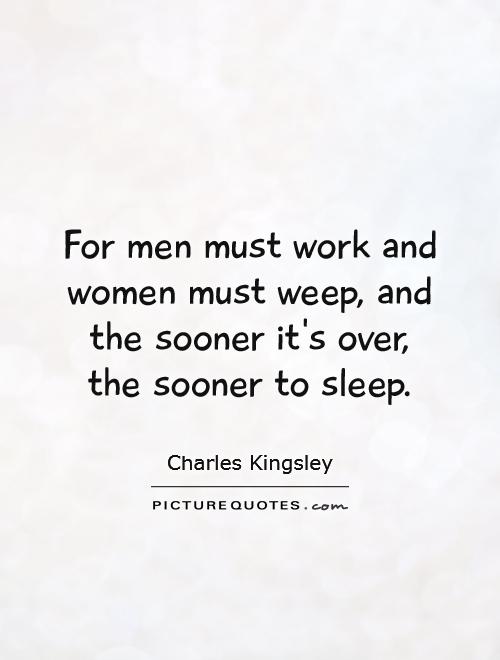For men must work and women must weep, and the sooner it's over, the sooner to sleep

For men must work and women must weep, and the sooner it's over, the sooner to sleep
The quote "For men must work and women must weep, and the sooner it's over, the sooner to sleep" is a line from the poem "The Three Fishers" by Charles Kingsley. This poem was written in the mid-19th century and reflects the societal norms and gender roles of the time. In this context, the quote speaks to the idea that men are expected to be the providers and breadwinners, while women are expected to be emotional and nurturing.Charles Kingsley was a Victorian-era writer and clergyman who often explored themes of duty, sacrifice, and the struggles of everyday life in his works. In "The Three Fishers," he tells the story of three fishermen who set out to sea in a storm and tragically lose their lives. The quote in question comes towards the end of the poem, as a reflection on the inevitability of death and the acceptance of fate.
The line "For men must work and women must weep, and the sooner it's over, the sooner to sleep" can be interpreted in several ways. On one level, it speaks to the traditional gender roles of the time, with men being seen as the providers who must work to support their families, while women are expected to be emotional and mournful in times of tragedy. This division of labor and emotion reflects the societal expectations placed on men and women in the Victorian era.
However, the quote can also be seen as a commentary on the inevitability of death and the need to accept one's fate. The idea that "the sooner it's over, the sooner to sleep" suggests a resignation to the hardships of life and a recognition that death is a natural part of the human experience. In this sense, the quote can be seen as a reflection on the fragility of life and the need to find peace and rest in the face of adversity.
Overall, the quote "For men must work and women must weep, and the sooner it's over, the sooner to sleep" encapsulates the themes of duty, sacrifice, and acceptance that are prevalent in Charles Kingsley's work. It serves as a reminder of the societal norms and gender roles of the Victorian era, while also offering a deeper reflection on the human experience and the inevitability of death.












 Friendship Quotes
Friendship Quotes Love Quotes
Love Quotes Life Quotes
Life Quotes Funny Quotes
Funny Quotes Motivational Quotes
Motivational Quotes Inspirational Quotes
Inspirational Quotes